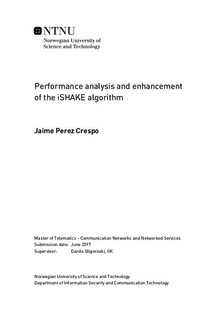| dc.description.abstract | In the era of the Big Data, immense amounts of data are being generated and processed every second. Research facilities like the European Large Hadron Collider (LHC) in Geneva generate massive amounts of information every second. When data in such large volumes needs to be processed by certain cryptographic algorithms to add integrity to it or even digitally sign it, traditional sequential hash functions are unable to cope with it.
Incremental hash functions have been proposed to alleviate some of the issues. However, they imply significant downsides and are still not enough to process the amounts of data that we generate nowadays. An innovative algorithm called iSHAKE has been suggested to allow a more efficient use of parallelism and in our previous work, we demonstrated the concept with a naive implementation. Now, we present an improved library that allows us to take the most out of modern CPUs, outperforming even the fastest algorithms available, and evaluate the advantages of using iSHAKE for several use cases. | |

